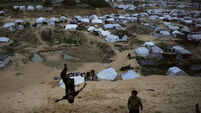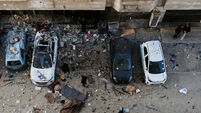Ex-Israeli security chiefs call for end to war as Netanyahu hints at new stage

Former Israeli army and intelligence chiefs called for an end to the war in Gaza as Prime Minister Benjamin Netanyahu hinted at further military action and Israel’s government plotted its next move in the devastated territory.
On the ground in Gaza, health officials reported new deaths on Tuesday of Palestinians seeking food at distribution points.














